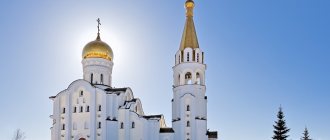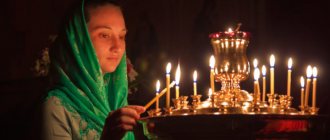Lecture given in Madrid in 1978.
At the beginning of our conversation, I would like, perhaps, to clarify something for those with whom we have the honor of meeting for the first time. When I say, “Why should we believe in God,” I do not mean any obligation or duty imposed on us from without. I propose to ask the question: what philosophical and even simple human reasons lead us to believe in what we call God?
And I wouldn’t like to talk today about something that will only be of interest to scientists: let’s leave the complex terminology for scientific departments. Our lectures are usually structured so that everyone can understand what is being discussed. First of all, this will be a conversation, my thoughts out loud, I will try to touch your hearts, touch and unite what already lives in them. This topic of faith in God is very important, and since it is urgent for us to penetrate into it and gain a deep understanding, we should talk about faith in a different way from the way we talk about something external, not in the way we are used to talk about trading or about any material things. I invite you to an internal search, to penetrate into the depths of your own soul in search of a spring beating in it, an underground river that allows us to feel the waters of life within ourselves. But we do not always manage to wash ourselves in these waters. Sometimes, at the most important, turning points in our lives, they appear as tears in our eyes.
As I said once, the most important things are the hardest to define. Therefore, I will talk about God, but I will not define God. It is not difficult to determine what, for example, a chair or some other everyday object is. Why? Because it has material properties, it is simple, because it does not have an ontological basis that would allow it to exist outside the present moment, not only here and now. And therefore the chair can be moved from one place to another, lifted, weighed, measured. But try to define Love - Love with a capital L, or the definition of life and death. If we set ourselves this goal, we would understand that we can only talk about manifestations of love, about certain consequences born of life or death; in other words, we would talk not about love, but about lovers, not about death, but about the dead, not about life, but about the living. And this means that if we talk about God, it is important for us not so much to define him as to discover him in ourselves and in all other people. Because as soon as we define him, as soon as we order him, as soon as we sign the protocol, limit God to four walls - in this prison he ceases to be what he is in his essence, he ceases to be God and turns into one of the many religious images that humanity has created over many centuries.
| Dolmen |
| Stone altar |
Faith in God, the ability to experience the feeling of the divine, the ability to discover God - this is one of the sensations, if you like, one of the forms of intuition, one of the most ancient, if not the most ancient feeling that a person has ever experienced. As an example, we can recall something ancient, something very ancient: a dolmen built by peoples about whom we have no idea, or, say, the Egyptian pyramids or the pyramids of Yucatan... These great structures bear the stamp of religion, or the words re-ligāre - the union of man with God, the presence of the divine in nature. Please note: exactly where the dolmen once stood, a Greek temple may have been later erected, then a Roman one, and then a Christian one. They all differed in their structure and architecture, but it was in this particular place that a monument dedicated to God always stood. When man first joined two stones together, my friends, he did not do it simply to lean on the resulting structure, nor did he do it to spark a fire and cook for himself. Ancient man placed one stone on top of another in order to erect the first column, the first pyramid, the first altar, in other words, for the first time to manifest feelings towards the divine. Everyone knows that among ancient peoples, for example the Hindus, the search for the primordial Fire has always been associated with a mystical feeling and with the idea of God. According to the Rig Veda, the most ancient deity among Hindus is Agni. Agni is a spark of fire that was born thanks to his father, the carpenter Vishvakarman: by the friction of wood on wood or stone on stone, the first spark, the first Agni, was born, from which all the other Gods then emanated. This is the concept of the primordial Fire, the primordial Divinity.
Let us now turn to the ancient culture of Egypt. The texts of the Egyptians tell us about the primordial deity A-tum, who over time transformed into Atum-Ra - the Fiery Sun that shines for everyone. The earliest papyri and wall texts reflect the first ideas of the Egyptians. They do not talk about food, or clothing, or war, or any other problem except the problem of the presence of God.
| Quetzalcoatlus |
We can think of many nations. Let's talk about some of them: it is useful to turn to the past of humanity from time to time. Let us remember Mesoamerica, whose legends tell of Quetzalcoatl, a bird with the characteristics of a snake. The word "Quetzalcoatl" means "snake bird". From Heaven, from the high spheres, Quetzalcoatl came to people, plunged into the earthly and penetrated into those areas that we today call hell, penetrated to the lowest, psychologically and physically, existence. He bowed to the bones of dead people and was reborn again among the living to guide them and lead them. And then he sailed off to sea on a boat and never returned.
The sea, the most ancient symbol, oceanos of the ancient Greeks. Every time I see the Nike of Samothrace in the Louvre, I remember what the ocean meant to the Greeks - an endless sea, where there are no piers to moor to, where to have fame means to board a ship and sail, and sail... And feel in the movement of oars and strong hands, how our voices fill the space with ancient songs, ancient words, and the wind fills the sails again, and we again sail across the ocean... The ocean, as Homer said, is like a huge sea of wine that approaches us and awakens our imagination, and before us appear Gods, enchanted islands... and people who were turned into pigs due to the fact that they did not possess spirituality.
If you want, we can talk about the Incas, who believed in Kon-Tiki Viracocha, the Creator of everything, from the world egg to all creatures. They talked about the constellations and believed that God resided in them, and they also believed that man’s connection with God was carried out with the help of the Rainbow.
All peoples, in all countries of the world, talk about this divine connection. The idea that human existence began with the discovery of the wheel, weapons, fire - an idea that some material scientists were willing to give us - is completely erroneous and has no scientific evidence. In fact, man began by discovering God, and having discovered him, he made an altar in His honor and created His image, embodying Him as best he could. Yes, then he invented the wheel to transport his altar; then, I believe, he produced fire by friction and tried to take advantage of the fire arising from lightning to light the fires on the altar and illuminate his Gods at night. Then he armed himself to protect what can be called a totem or something else - that which was higher for him than himself, that which existed before him and will exist after. And the first words that he taught to his children, his descendants, his students or followers were words dedicated to God.
| Egyptian pyramids |
| Mayan pyramids |
We talked about the structures erected by man and about his relationship with God. My friends, let's think a little, remember what the greatest structures have been erected by man. Egyptian pyramids? They were dedicated to God. Today we know very well that these are not tombs, we know that they have religious significance: they are monuments dedicated to the Gods, they are a gift to the Gods. When we remember something beautiful and extraordinary, we talk about the Parthenon. Okay, but this temple was dedicated to Athena Parthenos - the Great Virgin. Want to remember the Mayan pyramids? There were also deities and the “tree of life” there, and on the sarcophagus in one of the pyramids in the city of Palenque the “bird of resurrection” - the phoenix bird - is depicted. Man built all the great material works and structures because he was inspired by the Gods.
Probably someone thought: “Wait a minute, professor, there is still a huge structure built not in the name of God, but as a defensive one, this is the Great Wall of China with a length of more than 7,000 kilometers.” Yes, but still it was erected in the name of God. For the people who built it believed in God and defended themselves from barbarians who had neither laws nor morals. There is no such great building that was not built in the name of God.
We can talk about books too. We have already mentioned the Rig Veda, the beautiful Rig Veda written down by the Hindus; we can remember both the Mahabharata and the Bhagavad Gita, these are also works dedicated to God. Although today there are people who consider themselves very modern and are proud of having discovered the Kama Sutra - something, in their opinion, fundamental, but in fact the Hindus about one and a half thousand years ago abandoned its reading and passed it on to the Muslims. However, if these modern people were to read it in the original Sanskrit, they would find that this book is the tale of the god Kama, how he created the Universe and people and how, like Cupid, he shoots his arrows at certain, especially sensitive points of the human body; and it is not as irreligious as it may seem.
| More than heroes, God needs people who know how to live everyday. |
Let us remember the “Iliad” and “Odyssey” - works that, although they belong to poems about heroes, nevertheless always talk about the Gods. Let's remember the American Chilam-Balam... We can remember as much as we want. Doesn't the Bible, the Old and New Testaments, reveal the same connection between man and God that was spoken of thousands of years ago? In the name of these words from the Bible, people not only died, but also continued to live - and this is more important and more difficult, because, dear friends, it is easy to die... It is easy to die. You can die by jumping out of a window; to die is to pull the trigger of a loaded pistol, to die is simply to quickly turn the steering wheel of the car in which you are driving along a mountain road. But to live, to live every day, trying to fulfill the moral law, to live every day, trying to fulfill the law of love, to live every day, trying to accomplish a useful deed - this is much more difficult than dying. More than heroes, God needs people who know how to live everyday.
| Drawings in the Nazca Desert, Peru |
Can we say that God needs something? The point is that I am human. Of course, I know that philosophers, my colleagues listening to me, will say: “God is absolute. God needs nothing. God is in everything." But, as I already said, we will think about it a little. We must somehow imagine Him, feel Him, somehow be able to turn to Him in prayer. People first of all need to know how to pray and know how to die. A person joins his palms not only to hold a plate of food; a person makes certain gestures, which in India are called mudras, in search of contact with the Divine, contact with the Unknown, with what we call God. It doesn't matter what name we give Him, what matters is the evidence of the God we experience. Note that in ancient times, despite the fact that people had modest means, they built the Puma Punku, drew the Nazca Lines, were able to erect the Pyramids and the Parthenon, write the Odyssey, the Iliad, the Bhagavad Gita, the Bible... If people with such little opportunity were able to do this, isn’t it possible for someone whom in the Acropolis we call the new man to do the same?
| Saint Teresa of Avila. Peter Paul Rubens.1675Saint Teresa lived in the 16th century. and went down in history as the first woman theologian, writer and reformer of the Carmelite Order. |
Throughout history, there have been men and women who stand out from others because of their sense of God. It doesn't matter what religions they professed (at least it doesn't matter to me), it doesn't matter how they felt about Him; what matters is that they sensed His presence and somehow brought it into being. And in the history of Spain, don’t we know women, for example Teresa of Avila or Saint Rose, who felt strongly about God (although sometimes it may seem that religion is a purely male matter), who dedicated their most intimate thoughts to Him and managed to convey all this to us and convey to us brightly and strongly? They conveyed this to us with all their hearts, with all their souls, just as a mother feeds her newborn child. And as if born again thanks to these books, thanks to these Refuges, we feel that new strength, new hope, a new desire to live, a new goal for life are being reborn in us.
Therefore, we must believe in God. And not because it’s supposed to be that way, that it’s being imposed on us; not because, as the priests say, “even if hell does not exist, be afraid.” We must believe in God because it is natural, because this is how we differ from animals. The difference between a person and an animal is not that the animal has a tail, but that a person believes in God, feels God, but an animal does not. Therefore, as the teaching asserts, that way of thinking, that way of life, which removes us from faith in God or in the immortality of the soul, turns us into humanoids, into the scum of History, leads to the fact that our heart, our nerves, our veins become overgrown with wool , our brain and we turn into animals who talk all day only about food and material well-being.
| The difference between a person and an animal is not that the animal has a tail, but that a person believes in God, feels God, but an animal does not. |
We have become such materialists that when choosing an apartment, we first of all pay attention to what kind of bathroom it has, and never think about finding a place for prayer. Our grandfathers always looked to see if there was a place where they could kneel to turn to God. We are trying to choose a good bath to be with something that has no name. Gentlemen, our heads are filled with garbage, something bad, rotting; this is alienation, and it is the worst form of pollution. The worst pollution is not the result of oil or nuclear radiation. It is created by people who deny God, by those who, in their evolution, threw themselves back millions of years in order to become animals, in order to again be deprived of the opportunity that our ancestor had - the one who lived in times about which neither the ancient Greeks nor the Romans knew anything. could not remember, and the Egyptians did not mention it even in the most ancient papyri. This is that primitive man who put one stone on top of another in order to worship Something that he internally felt, That which allowed him to perceive nature - not only to exploit it, not only to coexist with it purely biologically, but to understand it and turn it into music, poetry, philosophy and love.
| If we do not feel like children of God, an emanation of God, then where will brotherhood come from, where will love for people come from? |
If we do not feel like children of God, an emanation of God, then where will brotherhood come from, where will love for people come from? If we do not feel that we are children of the same Father, born of the same reality and sharing a common destiny, then how can we feel that we are together, that we are connected? We feel it physically, even now, in this room, because we don’t have enough chairs to make ourselves more comfortable. However, in the moral, spiritual space we do not have this feeling. We need to recognize the children of God in ourselves, we need to feel that we all have something in common, but not on the plane of the transitory, not just the cold or hunger that both we and animals are capable of experiencing. We need to feel something common within us that does not belong to the realm of the transitory. As the ancient American book Chilam Balam says, we need love that lasts longer than three days, we need kings that reign longer than three days, we need laws that last longer than three days, we need reality that lasts longer than three days. Everything we possess is ephemeral, transitory, and we are so attached to this transitory that we feel depressed, confused and, like a squirrel in a wheel, spinning in one place. We have lost the idea that the one who is in front of us, and the one who is nearby, and even the one who, due to circumstances, acts as our enemy - they are all our brothers. We must love our neighbor truly, deeply, and not just show it outwardly. The external is not the main thing. As it is said in “The Little Prince,” my friends, you cannot see the most important things with your eyes. Sometimes we can do something seemingly cruel, but do it lovingly. For example, a surgeon is performing an operation, and someone, not understanding what’s going on, may exclaim: “What a nightmare, he’s killing him!” But in fact, the doctor saves the patient’s life and is driven by love. Conversely, sometimes people hug and kiss us, but they do it to deceive us or take away what little we have. Therefore, the external is secondary, the main thing is the internal action, an act of good will and faith.
We need to experience a sense of faith again, not only individually, but collectively. I don't mean any particular religion, I'm just talking about the collective belief in God and the immortality of the Soul. We need to know that we are children of God, to know ourselves, to overcome the fear of death, to overcome many of our fears, to realize that we are immortal...
Observe nature, look: God gave caterpillars such a color that helps them blend in with their environment, and this saves their enemies. God gave luminous eyes to fish living in the depths so that they could illuminate the darkness at a depth of thousands of meters. He gave the birds light, porous bones to make it easier for them to fly into the air. God endowed all creatures with the properties they needed.
Until recently they said that all this was done by evolution, that this is the result of the struggle of animals for survival. But today computers - sometimes they cause harm, but sometimes they can also be useful - have shown that in this case the Earth must be a thousand times older. In other words, the age that is attributed to it is not sufficient for the cells and various elements to combine in such a way as to adapt to various living conditions and develop all the diversity of highly organized life that exists today.
This means that there is mercy, there is great love, there is a great Thinker who planned all this. He made it so that the seeds falling from the tree have wings, thanks to which they rotate - why not the first helicopter? - and fly away from the mother tree, because if they fell in its shade, on damp soil, they would die. Whirling, the seeds fly away to where there is sun and a new tree can grow.
But if Someone or Something planned all these complex processes that happen to all beings - for example, the mystery of sperm being able to move thanks to tails, the divine balance of the roots and branches of a tree, the falling of leaves and the spreading of seeds - if It took care of everything , thought about everything, tell me, could It forget about Man, about you and me? It had to take care of us, both physically and spiritually. Why then be afraid of death? Why be afraid of troubles - be it death, bad luck or, worse, loss of luck, loss of love or simple psychological balance?.. Isn't God hiding behind all this? Isn’t all this like steps, thanks to which we can rise, move along the road of evolution, become stronger, become closer to the Divine, transform into something new, strong? Isn’t all this in the realm of the plans of the Great Intelligence, thanks to which every time we stumble, an invisible hand lifts us up, like the resurrected Lazarus? Isn't there Something that picks us up if we fall? Don't we have what caterpillars and trees have?
It is obvious that what exists for caterpillars and trees exists for humans, and for entire groups of people, and for the entire human culture, but first we need to re-realize God, first we must get away from the already outdated materialism and achieve true spirituality. I'm not talking about external manifestations now. A person can pray in front of the image of Christ and at the same time be very far from spirituality. Conversely, a person can honestly and conscientiously forge iron for the benefit of people, work in a factory, office or university, and thereby perform actions that are much more mystical than a person who simply kneels.
We must deeply feel God, we must return to faith in God, as in those distant times when people, belonging to different religions, all believed in God. Some spoke about Christ, others about Jehovah, others about Allah, but they all spoke about the same thing. The Roman Empire was inhabited by very different people, they spoke many languages; and when they met somewhere on the roads, they, recognizing each other, raised their right hands and uttered the word “Ave!” (which means “holy, sacred”). That is, the sacred was a sign of recognition, the sacred united people in the empire. And for humanity this feeling of community, unity continues to remain sacred.
Unfortunately, today we know about this great state mainly from unsuccessful movies (at least a few years ago this was the case), so it would be good to mention how things really were. The Roman Empire had scientific research, religious freedom, and miracles; Jesus Christ was born in the Roman Empire, gentlemen. So the past cannot be neglected; we should understand that the past is the roots of the present. And the present, in turn, must become a strong trunk in order to bear the crown of the future.
We must dream of a new person who will be easy to recognize anywhere by this Ave, by the sacred that he carries in his soul.
What an Acropolis dream! This is the main Acropolis dream! Any form of knowledge, understanding, reasoning is useless if we do not discover God in ourselves and in nature. A real philosopher is not one who knows by heart definitions from the works of Kant and Plotinus, Thomas Aquinas or anyone else. No, a real philosopher is not a Platonist, not a follower of Aristotle or Kant. A true philosopher is a simple man who knows how to understand nature; someone who, even if left without books, can continue to read, and if left without nature, can continue to dream.
We must dream of a new man who will again have deep faith in God. Look: people dreamed of flying to the moon, and the day came when their dream came true. So let's dream of a new person who will feel God, believe in God and act in the name of God! Let's dream about him, even if we don't know what this person will look like, what color his skin will be, how he will dress, what nation he will belong to, what words he will address to God and what gesture he will make that will point beyond the horizon. That's all I wanted to tell you about this Great Mystery. Stay with God!
Why are most modern scientists and philosophers non-believers?
It must be said that the dynamics in the philosophical environment are more favorable for theism; believers occupy an increasing place among philosophers - but in any case this is not important from the point of view of the truth about the world. In XIII, 100% of philosophers were theists, but a survey conducted at the philosophy department of Moscow State University in 1975 would show 100% atheists and materialists. Truth is not determined by a majority of votes, much less a majority of votes in a particular environment at a particular time. The predominance of certain views is a feature of the cultural environment. In American colleges - which is where most surveys of this kind refer - it is quite left-wing and atheist.
Environment, geography
As a rule, a person born into a religious family also becomes a believer. And the geographical place of birth influences what faith he will adhere to. For example, Islam is widespread in the Middle East (Afghanistan, Kyrgyzstan, etc.) and in northern Africa (Egypt, Morocco, Libya). But Christianity with all its branches is widespread in almost all of Europe, North America (Catholicism and Protestantism) and in Russia (Orthodoxy). That is why in a purely Muslim country, for example, almost all of the believers are Muslims.
Geography and family usually influence whether a person becomes religious at all, but there are a number of other reasons why people believe in God later in life.
Explanation of the laws of nature and everything unknown
What is God for people of the past? Faith then played a key role in people's lives. There were very few who were atheists. Moreover, the denial of God was condemned. Civilizations were not advanced enough to explain physical phenomena. And that is why people believed in deities responsible for various phenomena. For example, the ancient Egyptians had the god of air Amon, who was later responsible for the sun; Anubis patronized the world of the dead and so on. This was not only the case in Egypt. It was customary to praise the gods in Ancient Greece and Rome; even before civilizations as such, people believed in deities.
Of course, over time, discoveries occurred. They discovered that the earth is round, that there is vast space, and much more. It is worth considering that faith has nothing to do with a person’s mind. Many scientists, discoverers, and inventors were believers.
Nevertheless, even now, answers to some main questions have not been found, such as: what awaits us after death and what happened before the formation of the Earth and space as a whole? There is a theory of the Big Bang, but it has not been proven whether it actually happened, what happened before it, what caused the explosion, and more. It is unknown whether there is a soul, reincarnation, etc. Just like it has not been proven for sure that there is absolute and complete death. There are a lot of disputes on this basis in the world, but this uncertainty and unknown cannot be avoided, and religions provide answers to these eternal questions.
Does believing in God make people happy?
One of the questions that ardent minds are raising concerns the relationship between faith and well-being. A number of studies report that among a control group of more than 160,000 Europeans, 85% of those who regularly go to church confidently said they were “very satisfied with their lives.” At that time, the percentage was slightly lower among atheists - 77%. Psychologists insist on three factors why this happens:
- social support. Faith is not individual and implies integration into groups of practitioners who provide each other with psychological and material assistance;
- finding the purpose of existence. The level of happiness and well-being increases when a person understands why he lives and what he strives for;
- feeling of emotional unity. Communication with God brings a person a sense of satisfaction and increases his personal significance.
Faith in God versus medicine: can prayer save a dying person?
Most religions are closely associated with rituals that help restore health. Christianity despises shamans and healers and treats them as minions of dark forces, reminding us that you cannot give something to one and not take away from another: you have to pay for everything.
Photo by Gift Habeshaw: Pexels
But the main catalog of sins and punishments, the Bible, repeatedly mentions miraculous healings of the dying and welcomes the idea of pilgrimages to holy places.
Does faith really heal? Studies on the effectiveness of motives and rituals, yes, there are even such enthusiasts, show contradictory results. When it works, believers think it's a miracle, while skeptics insist it's a coincidence and a placebo effect. Success is explained, rather, by moral relief, which often affects the physical state.
Of course, treating cancer with holy water is dangerous and ineffective, but if faith in God helps you cope with minor everyday troubles and is spiritual support for medical therapy, then why not? You're right, it won't get any worse.
For a reasonable person, faith is a continuation of the spirit, the ability to see the invisible and do the impossible, to find the strength to hold on when everything around is falling apart.











